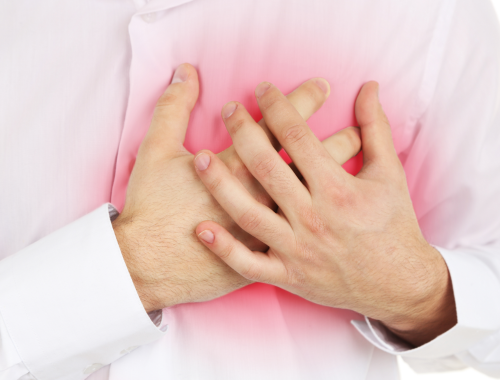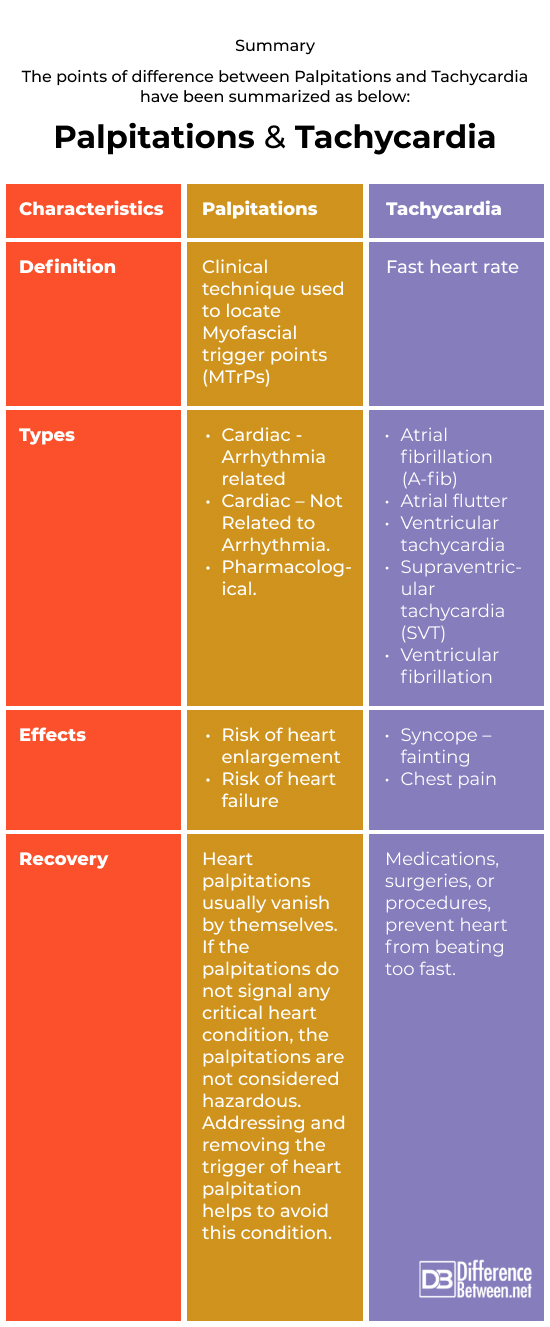Difference Between Palpitations and Tachycardia

Tachycardia (fast heart rate) is the term for a heart rate of more than hundred beats per minute. If the heart beats are superfast or erratic to allow the blood to flow adequately and in a smooth manner, it can cause palpitations (the feeling of added or missing a beat, the sensation that the heart is hammering), chest pain, dizziness, swooning (loss of consciousness), and fainting.

Similarity
Both conditions are associated with heart issues.
Palpitations
Palpitations is one of the symptoms of Tachycardia. Heart palpitations can feel like your heart is hammering (delivering repeated heavy blows), fluttering, or beating incorrectly frequently. They are typically brought on by nervousness. Pregnancy (carrying) coffee, alcohol, or spicy foods are some other factors for triggering palpitations. Heart palpitations are frequent and typically not harmful.
Tachycardia
Adults with tachycardia (fast heart rate) have heart rates more than hundred beats per minute. A heartbeat that is more than hundred beats per minute at rest is referred to as tachycardia (fast heart rate). It can begin in either the upper (right or left atria) or lower chambers (the right and left ventricles) of your heart and can be anything from minor to fatal. Medicines, an ablation operation (destroying or eliminating), and the installation of an implanted cardioverter defibrillator (ICD) (automated implantable cardioverter defibrillator) are all forms of treatment.
Difference between Palpitations and Tachycardia
Definition
Palpitations
Palpitations is one of the symptoms of Tachycardia. It is a common, though not mostly dangerous, feeling that the heart is pounding, racing, beating irregularly, fluttering, or skipping a beat.
Tachycardia
A tachycardia is a rapid heartbeat (over 100 beats a minute) that is out of proportion (higher than normal) to one’s age and amount of exertion or activity sometimes showing no symptoms, whether it be regular or irregular.
Symptoms
Palpitations
- beats too quickly
- fast fluttering (alarming sensation)
- Flip-flopping
- Pounding
- cutting off beats
Tachycardia
- palpitations, or the sensation that your heart is fluttering or speeding,
- chest discomfort
- dropping out (syncope)
- Lightheadedness
- rapid heartbeat
- breathing difficulty
Treatment
Palpitations
- Relaxation techniques like deep breathing, aromatherapy, biofeedback, Guided imagery, meditation etc
- Reduce stress
- Do not use stimulants
- Do not use illegal drugs
Tachycardia
- Antiarrhythmic drugs (beta-blockers, propranolol (Inderal) or metoprolol (Lopressor), apixaban (Eliquis))
- Cardioversion and defibrillators (an implantable cardioverter defibrillator)
- Vagal maneuvers to regulate the heartbeat (apply cold water, apply pressure on the abdomen)
Summary
The points of difference between Palpitations and Tachycardia have been summarized as below:

FAQ:
Are palpitations and tachycardia the same thing?
Generally speaking, tachycardia (very fast heart rate) can cause the following symptoms and signs: palpitations, or the sensation that your heart is fluttering or speeding,
What heart rate is considered palpitations?
If there is erratic and very abnormal (too fast and too slow) heartbeat giving a feeling of your heart racing, thumping, throbbing, quavering or pounding in your chest, it is called palpitations.
Do palpitations cause tachycardia?
Heart palpitations (a feeling of pounding, racing, flip-flopping heartbeats) can occasionally be an indication of a serious condition, such as an arrhythmia (Improper beating of the heart). A very quick heartbeat (tachycardia) could be triggered by arrhythmias.
What can be mistaken for heart palpitations?
Heart palpitations can at infrequent or irregular intervals be mistaken for atrial fibrillation, an extremely severe sickness. Rapid electrical signals (the stimulus is an electrical signal (current)), that cause the 2 upper chambers of the heart (atria) to contract swiftly and erratically are the cause of atrial fibrillation (AFib).
Can I have palpitations and my heart rate be normal?
Palpitations (fast heart beat) can occasionally be brought on by a medical condition, anxiety, physical activity or work out, or medicine. Even though heart palpitations (erratic heartbeats) can be unsettling, they usually do not signal any danger or serious concern. Rarely, heart palpitations may be a sign of a more critical or severe heart condition, such as an arrhythmia (improper beating of the heart), which may need to be treated.
Is it normal to have heart palpitations all day?
Heart palpitations (a feeling of pounding, racing, flip-flopping heartbeats) typically do no harm and vanish on their own. However, in rare instances, they could be caused by an arrhythmia (when your heart beats too fast, too slow or is irregular), which is a medical condition. Heart palpitations might make you feel nervous and afraid even though they are frequent.
When should I be worried about palpitations?
Consult your General Practitioner if you feel as though you have frequent or protracted palpitations, or if you also experience symptoms like chest pain or lightheadedness during these episodes.
How long is too long for heart palpitations?
Heart palpitations that last for longer than thirty seconds are considered as serious and a medical emergency. Longer heart palpitation is an indicator of underlying heart conditions such as coronary artery disease (CAD, atherosclerotic heart disease) or issues with the heart valves.
Do palpitations show on an ECG?
If the heart palpitations are erratic, the ECG may not be able to record them.
- Difference Between Global Warming and Greenhouse Effect - May 18, 2024
- Difference Between Vaccination and Immunization - March 3, 2024
- Difference Between Selective Mutism and Autism - February 25, 2024
Search DifferenceBetween.net :
Leave a Response
References :
[0]Abbott, A. V. (2005). Diagnostic approach to palpitations. American family physician, 71(4), 743-750.
[1]Delacrétaz, E. (2006). Supraventricular tachycardia. New England Journal of Medicine, 354(10), 1039-1051.
[2]Raviele, A., Giada, F., Bergfeldt, L., Blanc, J. J., Blomstrom-Lundqvist, C., Mont, L., ... & Shah, D. C. (2011). Management of patients with palpitations: a position paper from the European Heart Rhythm Association. Europace, 13(7), 920-934.
[3]Umana, E., Solares, C. A., & Alpert, M. A. (2003). Tachycardia-induced cardiomyopathy. The American journal of medicine, 114(1), 51-55.
